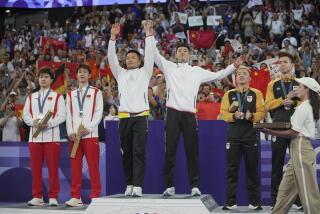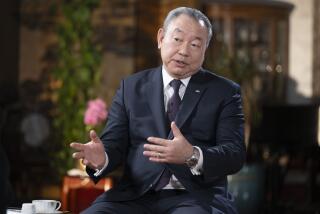China Refuses Taiwanese Olive Branch
TAIPEI, Taiwan â China on Friday swiftly rejected Taiwanâs attempt to repair relations, returning--unopened--a letter that explained President Lee Teng-huiâs controversial call for âspecial state-to-stateâ ties.
Leeâs declaration this month that Taiwan should be recognized as a âspecial stateâ and not a renegade Chinese province infuriated Beijing, which interpreted it as a move toward independence. Beijing hinted that it would suspend planned talks unless Taipei âclarifiedâ the statement.
The letter from Taiwanâs top envoy for China relations, Koo Chen-fu, tried to defuse tensions by reaffirming Taiwanâs desire to unite with the mainland and asking that talks scheduled for this autumn proceed. But it didnât back away from Leeâs contentious view that Taiwan and China are separate but equal âspecial states.â
âWhat we see as âone Chinaâ is something for the future,â Koo wrote in the letter, which he read at a news conference Friday. âChina at present is divided and ruled separately by two equal sovereign states in existence at the same time, hence a special state-to-state relationship.â
Beijing dismissed the explanation as âa grave violation . . . of the âone Chinaâ principle, and we reject it,â a spokesman for Chinaâs Assn. for Relations Across the Taiwan Straits, or ARATS, said in Beijing. China holds that Taiwan is a part of the nation and that the Taipei government has the status of a provincial leadership. Chinese President Jiang Zemin is determined to bring Taiwan back into the fold before he likely steps down in 2002 and refuses to give ground to what he considers an upstart province.
Beijing signaled Sunday that bilateral talks set for autumn in Taiwan between Koo and ARATS chief Wang Daohan may be off. âIf we are not talking about âone China,â then there is nothing to talk about,â an ARATS spokesman said last week. But Beijing has not yet formally canceled the talks, leaving the door open for Koo to try again.
Washington is urging Taiwan to reframe the âspecial stateâ assertion to minimize regional tensions. Beijing has vowed to use force if necessary to reclaim Taiwan and has splashed pictures of military exercises across TV screens and newspapers.
The U.S. dispatched two aircraft carriers after the last cross-strait flare-up in 1996 and doesnât want to have to do it again. In the days after Leeâs July 9 statement, U.S. envoys to Beijing and Taipei urged both sides to resolve the dispute peacefully.
Beijingâs rejection of the letter puts the ball back in Taiwanâs court, but officials in Taipei say they do not plan to clarify the clarification.
âBoth sides have a ball,â said Su Chi, chairman of Taiwanâs Mainland Affairs Council. âBoth sides can serve.â
But analysts fear that cross-strait relations will remain frozen until spring, after new presidential elections in March put Leeâs successor in the negotiating seat.
âAs long as there is no military action,â said C.V. Chen, the founder of Taiwanâs Straits Exchange Foundation, âMarch may solve the problem.â
More to Read
Sign up for Essential California
The most important California stories and recommendations in your inbox every morning.
You may occasionally receive promotional content from the Los Angeles Times.










